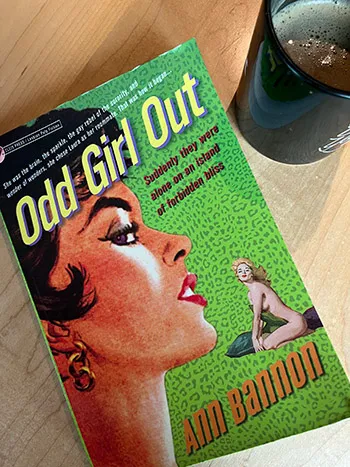
ODD GIRL OUT
ANN BANNON
© 1957, 2001 Ann Bannon
$20.95
212 pages
Content warning: Domestic violence
As much as I love a good Happily Ever After (HEA, for the romance buffs), I'm a sucker for a soft breakup (an SBU?). The hallmarks are the same: personal growth, care for the other person, dramatic declarations at some transportation hub. Why can't we have stories that celebrate good relationships rather than long ones? As anyone with boomer parents can tell you, relationship longevity is a terrible indicator of quality.
Odd Girl Out, written by "Queen of the Lesbians" Ann Bannon, is a top-shelf soft breakup. It initially closely parallels Vin Packer's Lesbian pulp fiction novel Spring Fire: Both follow the relationship of a senior-and-freshman pair of "roommate" sorority sisters. Both feature a lusty brunette and a vestal blonde. Both hit classic 1950s highlights – getting Cokes, drinking and driving, engaging in casual domestic violence, and, inexplicably, hanging out at Walgreens.
Thankfully, though, the relationships here are more emotionally nuanced and hinge less on the "trauma as identity" trope (although they don't escape it entirely). Beth is stuck in a love triangle, split between emotional fulfillment with her boyfriend Charlie and hot sex with her roommate Laura. Wet-behind-the-ears Laura loves Beth with the devotion bordering on obsession of a baby Queer. Even though Beth knows she's in love with Charlie and not Laura, she can't break it off because Laura "would be sad," so better to string her along, right? In a similarly dick move, Laura tries to control Beth's movements and manipulate Charlie out of Beth's life.
While Beth is an asshole, I was sympathetic to her struggle to define her identity in an era when the DSM-I labeled homosexuality a "sociopathic personality disturbance." She's only been attracted to two people so far, Charlie and Laura, and she is forced to generalize from her feelings toward them to some permanent sense of how her attraction will always function in terms of their respective genders. She likes Laura's devotion to her but assumes their relationship will follow this dynamic in the future and never be equal. Charlie is a good match for her, and because he's the first one, she assumes she'll only ever be able to have this sort of equal relationship with men.
Ultimately, Beth chooses Charlie and Laura leaves to find Queer community in Greenwich. The heartbreak here is not in the inevitable breakup, but in the divide between two people who can exist in the Queer community and still fail to understand each other. Both assume the other's feelings and Queer identity are identical to their own. Solidly Gay Laura assumes Beth is too weak to live authentically, and Bisexual Beth assumes Laura is too childish to commit to "real love," that is, with a man.
There are unfortunate tropes. Bisexuals are seen as open season for the nearest interested party to lay claim to. Both Laura and Charlie manipulate Beth and accuse her of making decisions out of spinelessness and "needing a man." Queer people's queerness is also expected to have a "root" in some family trauma (again, this was before psychologist Evelyn Hooker argued that homosexuality was not a mental illness, so the DSM-I was still heavily influential). Beth's parents are dead and Laura's parents are (gasp) divorced.
Where this novel differs dramatically from previous Lesbian pulp (and many modern romcoms) is that the two love interests have friends – real friends who, while tragically straight, are very #ally. The Queers' internalized homophobia is as likely to be called out by straight allies as by other Queers. Emmy, Beth's best friend, sees Beth and Laura together and is supportive. When Beth thinks that women experimenting with other women is just that, Emmy calls her out on it. Emmy also calls out Beth's treatment of Laura, saying it's not a kindness to be dishonest. Straight man Charlie also shows his progressive chops with one-liners like "Men. Goddamn them all." He gives Beth genuinely good advice and tells her "not wanting to hurt Laura" is not a basis for a relationship. He's so, so close to being an actually decent human but, in the twilight hour, comes out swinging when he tells Beth, "You need a man."
The final chapter is worth reading for its beautiful, fabulist breakup. If my first Queer relationship had ended like this maybe I wouldn't have spent the next five years in straight denial. Laura comes into her own in this moment. She claims her identity and firmly tells Beth it's not a phase. Beth finally listens. They actually, genuinely communicate. Laura says to Beth, "It's not a question of forgiving. I'm grateful." Beth tells Laura, "You're not the only one who's grateful." Laura finally understands their relationship and sees her love for Beth not as an excuse to try to control her, but as an occasion for self-understanding and growth. Beth tells Laura that she loves her "not as Laura would have wanted her to, but sincerely, honestly, the best love she could offer." Not an HEA, but an SBU where both sides feel loved and valued? I'll take it.

